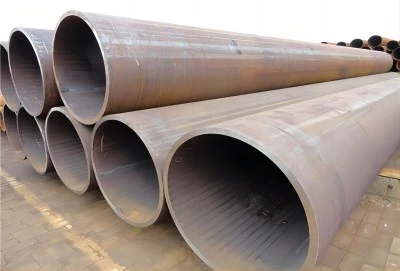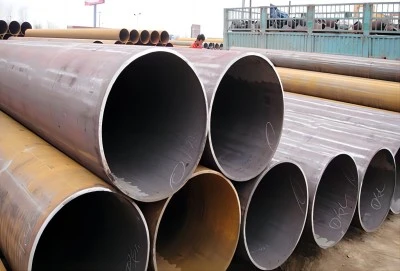How DSAW Improves Pipeline Strength and Durability
Double Submerged Arc Welded pipes are renowned for their exceptional strength and durability, making them an ideal choice for various applications in the oil and gas, water transportation, and construction industries. The DSAW process involves welding both the inside and outside of the pipe, resulting in a structure that can withstand high pressures and harsh environmental conditions.
The double welding technique used in DSAW pipes offers several advantages:
- Enhanced Structural Integrity: By welding both sides of the pipe, DSAW creates a more uniform and robust seam, reducing the risk of weak points along the pipeline.
- Improved Stress Distribution: The double weld helps distribute stress more evenly across the pipe's circumference, minimizing the likelihood of localized failures.
- Increased Corrosion Resistance: The double weld provides an additional barrier against corrosive elements, extending the pipeline's lifespan.
- Superior Fatigue Resistance: DSAW pipes exhibit excellent fatigue resistance, making them suitable for applications involving cyclic loading or pressure fluctuations.
The DSAW process utilizes a specialized welding technique that involves submerging the arc and the molten weld pool beneath a blanket of granular flux material. This method offers several benefits:
- Consistent Weld Quality: The submerged arc prevents atmospheric contamination, resulting in cleaner and more consistent welds.
- High Deposition Rates: DSAW allows for faster welding speeds and higher deposition rates compared to other welding methods, increasing production efficiency.
- Reduced Welding Defects: The flux acts as a shield, minimizing the occurrence of porosity, inclusions, and other welding defects.
- Improved Mechanical Properties: The controlled heating and cooling during the DSAW process contribute to better mechanical properties of the welded joint.
These characteristics make DSAW pipes an excellent choice for projects requiring high-strength, reliable, and long-lasting pipeline solutions.
Comparison of DSAW vs. Other Pipe Welding Methods
While DSAW pipes offer numerous advantages, it's essential to understand how they compare to other welding methods used in pipe manufacturing. Let's examine some common alternatives and their respective strengths and limitations:
1.Electric Resistance Welded (ERW) Pipes:
ERW pipes are manufactured by passing an electric current through the edges of the pipe to heat and fuse them together. Compared to DSAW pipes, ERW pipes have the following characteristics:
- Pros:
- Faster production speeds
- Lower manufacturing costs
- Suitable for smaller diameter pipes
- Cons:
- Limited to thinner wall thicknesses
- May have lower strength at the weld seam
- Not ideal for high-pressure applications
2.Spiral Welded Pipes:
Spiral welded pipes are created by coiling a steel strip into a helical shape and welding the seam. Here's how they compare to DSAW pipes:
- Pros:
- Efficient use of raw materials
- Can produce large diameter pipes
- Suitable for lower pressure applications
- Cons:
- Lower fatigue resistance due to helical weld
- May have limitations in high-pressure scenarios
- More complex inspection and repair processes
3.Single Submerged Arc Welded (SSAW) Pipes:
SSAW pipes are similar to DSAW pipes but involve welding only one side of the pipe. The comparison with DSAW pipes is as follows:
- Pros:
- Faster production process
- Lower manufacturing costs
- Suitable for moderate pressure applications
- Cons:
- Lower overall strength compared to DSAW
- Reduced corrosion resistance
- May not meet requirements for high-pressure or critical applications
When comparing these welding methods, it becomes evident that DSAW pipes offer superior strength, durability, and reliability, particularly for high-pressure and critical applications. While other methods may have advantages in terms of production speed or cost, DSAW pipes provide a level of quality and performance that is unmatched in demanding environments.
Choosing the Right Double Submerged Arc Welded Pipe for Your Project
Selecting the appropriate DSAW pipe for your project requires careful consideration of various factors. Here are some key aspects to keep in mind when making your decision:
1.Material Selection
The choice of base material for your DSAW pipe is crucial and depends on the specific requirements of your project. Common materials include:
- Carbon Steel: Suitable for general-purpose applications and offers good strength at a reasonable cost.
- Low-Alloy Steel: Provides enhanced strength and corrosion resistance for more demanding environments.
- Stainless Steel: Offers excellent corrosion resistance and is ideal for applications involving aggressive chemicals or high temperatures.
Consider factors such as operating pressure, temperature, and the corrosiveness of the transported medium when selecting the appropriate material for your DSAW pipe.
2.Pipe Dimensions
DSAW pipes are available in a wide range of dimensions to suit various applications. Key dimensional considerations include:
- Diameter: DSAW pipes can be manufactured in diameters ranging from 16 inches to 100 inches or more, depending on the manufacturer's capabilities.
- Wall Thickness: The wall thickness of DSAW pipes can vary significantly, typically ranging from 6mm to 40mm or more, depending on the pressure requirements and design specifications.
- Length: DSAW pipes are often available in lengths up to 12 meters or more, which can help reduce the number of field welds required during installation.
Ensure that the selected pipe dimensions align with your project's design requirements and any relevant industry standards or regulations.
3.Welding Parameters and Quality Control
The quality of the welding process is crucial for ensuring the performance and reliability of DSAW pipes. When selecting a supplier, consider the following aspects:
- Welding Procedure Qualification: Verify that the manufacturer has qualified welding procedures that meet industry standards and your project specifications.
- Non-Destructive Testing (NDT): Ensure that the manufacturer employs comprehensive NDT techniques, such as ultrasonic testing, radiographic testing, and magnetic particle inspection, to verify the integrity of the welds.
- Quality Management System: Look for manufacturers with robust quality management systems, preferably certified to standards such as ISO 9001.
By carefully evaluating these factors, you can select a DSAW pipe that meets your project's specific requirements and ensures long-term performance and reliability.
4.Coatings and Linings
Depending on your application, you may need to consider additional protective coatings or linings for your DSAW pipes. Some options include:
- External Coatings: Fusion-bonded epoxy (FBE), polyethylene, or multi-layer coatings for corrosion protection and mechanical damage resistance.
- Internal Linings: Epoxy or cement mortar linings to protect against internal corrosion and improve flow characteristics.
- Insulation: For applications involving high-temperature fluids or to prevent heat loss in colder environments.
Discuss your specific requirements with the manufacturer to determine the most suitable coating or lining options for your project.
5.Supplier Expertise and Track Record
When choosing a DSAW pipe supplier, consider their expertise and track record in the industry. Look for manufacturers with:
- Extensive experience in producing DSAW pipes for similar applications
- A proven track record of successful project deliveries
- Technical support capabilities to assist with material selection and design optimization
- Compliance with relevant industry standards and certifications
By carefully evaluating these factors and working closely with a reputable manufacturer, you can ensure that you select the right DSAW pipe for your project, maximizing performance, reliability, and longevity.
Longma Group
In conclusion, Double Submerged Arc Welded pipes offer a superior solution for projects requiring strong and durable pipelines. Their unique manufacturing process results in pipes with exceptional structural integrity, corrosion resistance, and fatigue performance. By understanding the advantages of DSAW pipes and carefully considering your project's specific requirements, you can make an informed decision that ensures the long-term success of your pipeline infrastructure.
For expert guidance on selecting the right DSAW pipe for your project, please don't hesitate to contact our team at Hebei Longma Group Limited. Our experienced professionals are ready to assist you in finding the optimal solution for your pipeline needs.














